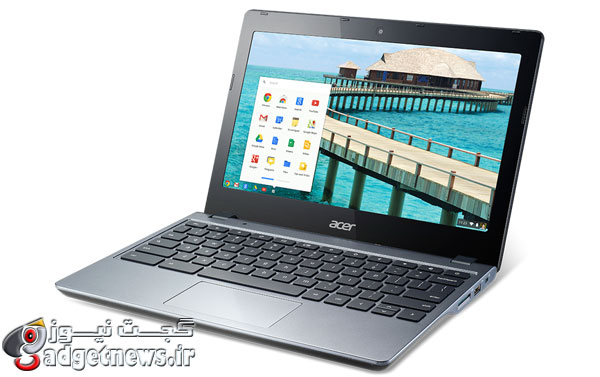
این روزها استفاده از کرومبوکها گستردهتر شده و این محصولات به دستگاههای جالبی برای کاربران تبدیل شدهاند. کمپانی ایسر به تازگی خبر از عرضهی اولین کرومبوک مجهز به پردازندهی Core i3 اینتل را داده است و قیمت آن نیز تنها حدود 350 دلار خواهد بود. از آنجایی که سختافزار کرومبوک و سیستمعامل Chrome OS با پیشرفت زیادی مواجه شدند، کمپانیهای مایکروسافت و اپل باید نگرانی خود را افزایش دهند. کرومبوکها در تلاش اخیر ایسر و ترکیب با اینتل، نشان دادند که تنها یک لپتاپ ارزانقیمت مخصوص کودکان نمیباشند. اینطور که برمیآید، ظاهرا کرومبوکها قدرت تبدیل به نوآورانه ترین محصول گوگل را دارند.
دو مدل جدید از سری C720 معرفی شده و نرخ قیمت به قدرت آن بسیار فوقالعاده میباشد. مدل C720-3871 مجهز به پردازندهی دو هستهای 1.7 گیگاهرتز از نوع Core i3-4005U، دو گیگابایت رم DDR3L، حافظهی 32 گیگابایتی SSD، گرافیک Intel HD 4400 و صفحهنمایش 11.6 اینچی با رزولوشن 768×1366 پیکسل است که با قیمت 350 دلار عرضه خواهد شد. در سمت دیگر، مدل C720-3404 قرار دارد که دارای دقیقا همان مشخصات مدل دیگر میباشد، اما در کنار رم آن عدد 4 گیگابایت با افزایش قیمت 30 دلاری درج شده است. این مشخصات قطعا خبر از یک ابرکامپیوتر عالی را نمیدهند، اما برای چنین سطح از قیمتی، لپتاپ خوبی به شمار میروند.
{photo}93/04/22/Acer-C720-Chromebook{/photo}
در کنفرانس I/O گذشته، گوگل اعلام کرد که به زودی Chrome OS قادر به اجرای اپلیکیشنهای اندروید و افزایش پیچیدگی برنامههای HTML5 خواهد بود، بدین معنی که دیگر نیازی به استفاده از پردازندههای نه چندان قوی بر روی کرومبوکها نمیباشد. این مدلهای C720 جدید همچنین دارای عمر باتری 1.7 برابر کرومبوکهای دیگر هستند، از این رو استفاده از آنها در مسافرتها خوشایندتر خواهد بود.
با اینکه برخی بر این باورند که گوگل باید سیستمعامل کروم را به نفع اندروید از دور خارج کند، اما درواقع داشتن یک سیستمعامل مبتنی بر وب ایدهای فوقالعاده میباشد. علاوه بر تمرکز بر وب، وجود یک لپتاپ ارزانقیمت ساخته شده بر اصول گوگل برای بسیاری از کاربران جالب توجه و موردنیاز خواهد بود.
منابع : extremetech | androidcentral
Chromebooks just became a lot more interesting! Acer recently announced that it will be shipping the first Chromebook featuring an Intel Core i3 processor, and it will only cost about $350. As Chrome OS and Chromebook hardware both become more capable, the more Microsoft and Apple need to worry. Combined with Intel’s dogged support for Chromebooks, this latest push by Acer shows that Chromebooks can be much more than just cheap laptops for kids. As it stands, the Chromebook might just be Google’s most intriguing initiative to date.
Two new models of the C720 series were introduced, and the cost-to-horsepower ratio is outstanding. The C720-3871 sports a dual-core 1.7GHz Core i3-4005U CPU, 2GB of DDR3L RAM, a 32GB SSD, integrated Intel HD Graphics 4400, and a 1366×768 11.6-inch display for $350. On the other hand, the C720-3404 has almost exactly the same specs, but sees a boost to 4GB of DDR3L RAM for an additional $30. These certainly aren’t supercomputers, but those are some surprisingly solid internals for a laptop this cheap.
Acer Chromebook At its I/O conference last month, Google announced that Chrome OS will soon be able to run Android applications locally, and the increasing complexity of HTML5 applications means that you don’t want to be stuck using the underpowered CPUs found in most Chromebooks on the market. Unlike the other Chromebooks topping the sales charts on Amazon, I might actually invest in one of these. It’s not as compelling as the beefy Chromebook Pixel, but it’s less than a third of the asking price. On top of that, these new C720 models have 1.7 times the battery life of a Chromebook Pixel, so they’re much more viable for travelers.
While PCMag’s Sascha Segan would prefer Google to kill off Chrome OS in favor of Android, I think Chrome OS is an incredible idea. The vast majority of my work and entertainment is accomplished inside of a web browser, so the idea of a stripped down operating system focused on the browsing experience sounds splendid to me. Similarly, my girlfriend is in the market for a new computer for college, and a cheap laptop built around Google Docs is the perfect fit for her. Google hasn’t quite lived up to the promise of the Chromebook just yet, but I’m hopeful that more powerful hardware and a stronger focus on snappy local apps will turn Chrome OS into a real contender.
 گجت نیوز آخرین اخبار تکنولوژی، علم و خودرو
گجت نیوز آخرین اخبار تکنولوژی، علم و خودرو 




